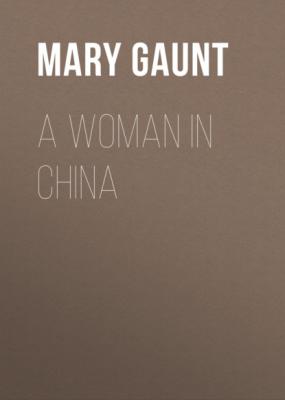A Woman In China. Mary Gaunt
Читать онлайн.| Название | A Woman In China |
|---|---|
| Автор произведения | Mary Gaunt |
| Жанр | Книги о Путешествиях |
| Серия | |
| Издательство | Книги о Путешествиях |
| Год выпуска | 0 |
| isbn | 4057664605818 |
But the holding of that wall by an armed force, that dominates both the Chinese and the Tartar Cities, seems to me the very greatest thing in the way of insults. Some day when the Chinese are a united nation, powerful as they ought to be, they will awake to that insult, and the first thing they will do will be to clear their wall from foreign interference. Meanwhile, as I sit in a courtyard of a temple of the Western Hills, drinking in the sparkling air of September, looking at the lovely blue sky peeping through the dark green branches of the temple pines, as I sit and write this book, I think gratefully of that loose-limbed, lissom, athletic, young American soldier who, with rifle across his shoulder, is doing sentry-go upon the wall. The German is there too, the stiff, well-drilled, military German, but my heart goes out to the man who is nearer akin, and whose speech is not unlike that of the people of my own land. It seems to me I am safe here, alone among the Chinese, because of those soldiers. There are those who will say I am wrong, that the Chinese are always courteous, and that they like me because of the money I put into their pockets. And that is true enough too. I have found the very rickshaw coolie a finished, courteous gentleman in his manner towards me, and I have received many little acts of kindness which could but come from a kindly heart, with no thought of profit behind it; but still, deep down at the bottom of my heart, I know that the Chinese, more than any man on earth perhaps, respects power, and the Legation Quarter, and the holding of that wall, are an outward manifestation of power that reaches far and keeps me safe here in my mountain temple. The gods here by my side are dead, who fears or respects the gods, Spanish chestnuts are stored beside their altars, but the foreign soldiers on the wall are a fact there is no getting over. It impresses those in authority, and the fiat goes forth, permeating through all classes, “The foreigner is not to be touched under any circumstances whatever.”
On this wall come the foreign community to exercise and promenade in the cool of the evening in summer, or to enjoy the sunshine at midday in winter, and here all the soldiers and sailors of the various nationalities foregather. There is no other place in all Peking where one can walk with comfort, for the Chinese as a nation, have no idea of the joy of exercise. They have put it out of the power of their women to move save with difficulty, and that a man should take any pleasure in violent exercise seems to them absurd. To walk when he can ride in a rickshaw, or mount a donkey, would argue something wrong in his mental outlook, so it happens that, in all the great city, there are only the streets of the Legation Quarter and the wall where walking exercise can be indulged in. The streets of the Quarter are the streets of an uninteresting, commonplace town, but the wall overlooking the two cities is quite another matter. Here the part of the foreign community that does not ride takes its exercise, and foregathers with its kind.
The foreign quarter is not always thinking of the dangers it is guarding against. That it thinks also a great deal of its amusement, goes without saying. I have observed that this is a special characteristic of the Briton abroad. At home the middle-class man—or woman—is chary of pleasure, taking it as if it were something he had hardly a right to; but abroad he seizes eagerly the smallest opportunity for amusing himself, demanding amusement as something that hardly compensates him for his exile from his native land. So it has come that I, a looker-on, with less strong bonds than those from the Old Country binding me to my father's land, fancy that these exiles have in the end a far better time than the men of the same class who stay at home. I am apt to have no pity for them whatever.
One thing is certain, people keep horses here in Peking who could not dream of such a luxury in England. True, they are only ponies fourteen hands high, but a great deal of fun can be got out of pony racing. And racing-stables are a feature of the Quarter. Not that they are in the Quarter. On the plain, about five miles to the west of the city, lies the little race-course, and dotted about within easy distance of this excellent training-ground are the various training-stables for the ponies. The China pony comes from Mongolia, where close watch and ward is kept over him, and neither mares nor stallions are exported.
“If I could only get hold of a mare,” sighs the young racing man, but he sighs in vain. Meanwhile he can indulge in the sport of kings cheaply.
“I've joined another fellow in a racing-stable,” said a man to me, soon after my arrival in Peking, and I looked upon him with something of the awe and respect one gives to great wealth. I had not thought he was so well off. He saw my mistake and laughed.
